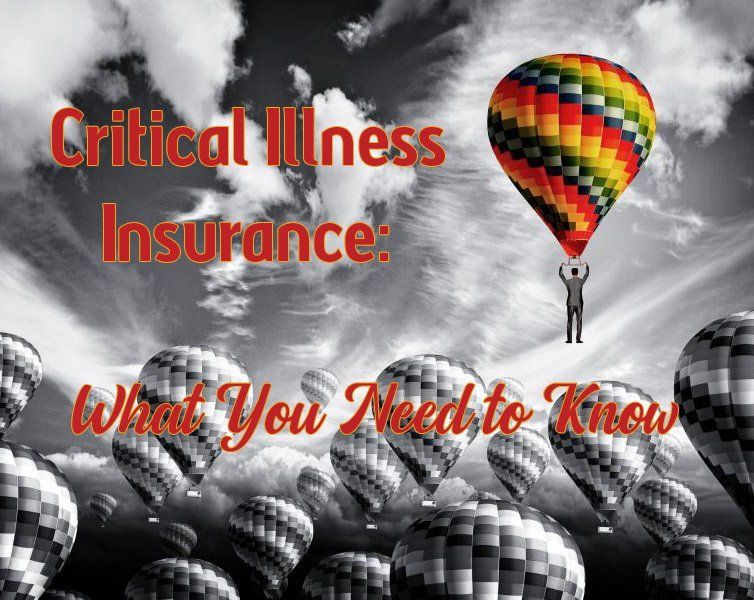Critical Illness Insurance: What You Need to Know
Critical Illness Insurance can help you rise above high medical costs in a time of medical crisis.

Critical Illness Insurance could be literally a life-saver for a person, as it “pays” when a person is diagnosed with a critical illness. Critical Illness Insurance can help a person protect his/her retirement savings, by providing necessary funds for treatment, and allowing one to “leave the retirement savings alone” until much later. Critical Illness Insurance can also be used to help with small-business employer groups by providing continuity from one generation or partner to another.
Critical Illness Insurance is typically an affordable option and has the potential to help cover medical costs not covered by traditional health plans. Critical illness protection plans generally provide a lump-sum payment for one or more covered medical conditions. These are subject to policy terms and specifications, including limitations and exclusions, so a word of caution is to ALWAYS understand exactly what one is purchasing, and what conditions are covered in the policy.
While carriers may differ somewhat in how their contracts and plans are written and what illnesses are covered, in general, critical illness plans are designed to allow the policyholder to choose the care and treatment preferred when undergoing medical situations. Some examples of illnesses that are typically covered in a good Critical Illness Insurance policy include illnesses such as a major organ transplant, diagnosis with a qualifying event such as a heart attack, invasive cancer, stroke, kidney failure, paralysis, severe burns, coma, and the loss of the sight, speech, or hearing.
The statistics on the aforementioned conditions, make it clear that more families need to fill these coverage gaps, in particular with the rising costs of deductibles. Some of the leading health organizations in the USA, such as the American Heart Association (www.heart.org) and the American Stroke Foundation (www.americanstroke.org) provide a number of helpful tips on their websites. In a rather mind-blowing statistic, approximately one in four Americans are living with some form of cardiovascular disease or the after-effects of stroke. While “Baby-Boomers” and Medicare beneficiaries are most prone to strokes, it is clear that research indicates the risk to younger generations has increased dramatically, as much as 150% among people ages 35-39 in just the last twenty years!
Most people feel invincible when they are “young” and it is difficult for individuals under the age of 50 to accept that strokes do not occur in only the older population. Not only can a stroke happen to someone at pretty much any age, the results of a stroke can be more debilitating than a heart attack.
The National Cancer Institute (www.cancer.gov) shows that the number of individuals living in American beyond a cancer diagnosis is expected to rise to nearly 19 million by 2024. Cancer is no respecter of persons and can strike at any time, at any age. Often, a cancer survivor’s conditions may constitute “critical illness” as spelled out in one’s Critical Illness Insurance policy and survivors of cancer will need assistance, often indefinitely, with paying for the cost of care.
For a person under the age of 65 and not on Medicare, health insurance policies have increasingly higher deductibles. In addition, one typically has significant exposure to high medical bills as maximum out of pocket expenses are also rising at an alarming rate. A Critical Illness Insurance policy can help mitigate that risk and keep one from a complete financial disaster in the case of a difficult medical diagnosis.
For a person having Medicare, even having Original Medicare Part A & Part B, and adding a Medicare Supplement Insurance plan, or Medigap (MAPD plan/Medicare C) does not necessarily equate to affordable cancer care. Depending on the type of supplemental plan a Medicare beneficiary has, cancer patients may still find themselves with significant out-of-pocket expenses of over $5000.00 and even much more.
For someone with a Critical Illness Insurance policy, the lump-sum benefit of the plan may help with direct costs such as deductibles, co-pays, co-insurance, and out-of-network medical expenses. Critical Illness Insurance plans bridge the gap between what the health insurance plan will pay and actual expenses incurred by the best specialists, physicians and hospitals, experimental drugs and therapies, and of course, travel, lodging, loss of income and the like.
With most policies, one has the freedom to use the policy payout as needed and can be used to supplement income, cover transportation-related expenses, and even regular living expenses, such as mortgage payments, monthly bills, and other debts—like a car payment. As a general rule, if insurance premiums are paid with after-tax dollars, then the benefits from the plan are received income-tax free, based on current federal income tax laws. However, one would be wise to speak with a qualified tax expert about one’s own particular situation, as all situations and tax rules/penalties vary.
For small business owners, a Critical Illness Insurance policy has the potential to bridge the gap in the business’ succession plans. A small business usually is the owner’s largest retirement asset and business succession plans are designed to protect the value of the firm from the catastrophic impacts of an untimely death of the owner.
One last word about Critical Illness Insurance plans—they may be “stand-alone” policies, or they may be included in another plan, such as a Term Life Insurance plan that includes “Living Benefits.” For the best guidance in which approach to take, I would be happy to offer you assistance, answer your questions, and help you get into an affordable Critical Illness Insurance plan. By the way, I have my own Critical Illness Insurance plan, and consider it one of my most important “assets.”
Again, Critical Illness Insurance is designed to help people keep their retirement and family savings intact, or to ensure small business continuity. One thing is sure, everyone should strongly consider adding a Critical Illness Insurance plan to their insurance portfolio.






